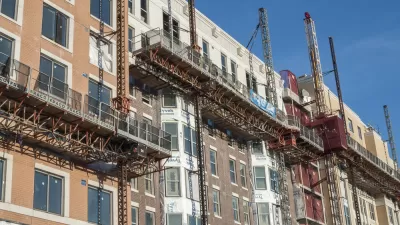There are signs that politicians at every level are responding to the concerns of renters like never before. If only renter-friendly housing policies were matters of simple consensus.

According to an article by Jenny Schuetz, politicians in some parts of the United States are beginning to recognize the political clout of renters—as evidenced by the pro-development political platforms of elected officials like California State Senator Scott Weiner and Minneapolis Mayor Jacob Frey. Typically renters have been fairly inactive compared to property owners, though Schuetz suggest that skyrocketing housing process are spurring more political action by cost-burened renters.
What does a new, renter-friendly politics look like? Schuetz considers the pros and cons of several approaches, including:
- The end of exclusionary zoning—or at least loosening the single-family residential zoning that cover most cities. Schuetz cites SB 827 in California and Minneapolis 2040 as two ambitious examples of this effort.
- Financial incentives for more abundant housing. Schuetz cites the bill proposed last week by Senator Elizabeth Warren (D-Mass.) and the Rent Relief Act proposed by Senator Kamala Harris (D-Calif.) as two examples of this approach.
One final platform plank under consideration here is rent control, which Schuetz describes as a "double-edge light saber." While rent control is a hit with renters and tenants-rights advocates, there's evidence rent control creates incentives for landlords to convert apartments to condominiums and creates disincentives for developers to construct new apartment buildings.
FULL STORY: ‘The Renters Strike Back’

Planetizen Federal Action Tracker
A weekly monitor of how Trump’s orders and actions are impacting planners and planning in America.

Maui's Vacation Rental Debate Turns Ugly
Verbal attacks, misinformation campaigns and fistfights plague a high-stakes debate to convert thousands of vacation rentals into long-term housing.

San Francisco Suspends Traffic Calming Amidst Record Deaths
Citing “a challenging fiscal landscape,” the city will cease the program on the heels of 42 traffic deaths, including 24 pedestrians.

Amtrak Rolls Out New Orleans to Alabama “Mardi Gras” Train
The new service will operate morning and evening departures between Mobile and New Orleans.

The Subversive Car-Free Guide to Trump's Great American Road Trip
Car-free ways to access Chicagoland’s best tourist attractions.

San Antonio and Austin are Fusing Into one Massive Megaregion
The region spanning the two central Texas cities is growing fast, posing challenges for local infrastructure and water supplies.
Urban Design for Planners 1: Software Tools
This six-course series explores essential urban design concepts using open source software and equips planners with the tools they need to participate fully in the urban design process.
Planning for Universal Design
Learn the tools for implementing Universal Design in planning regulations.
Heyer Gruel & Associates PA
JM Goldson LLC
Custer County Colorado
City of Camden Redevelopment Agency
City of Astoria
Transportation Research & Education Center (TREC) at Portland State University
Jefferson Parish Government
Camden Redevelopment Agency
City of Claremont





























